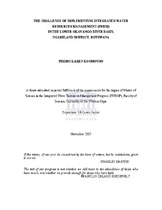| dc.contributor.advisor | Jonker, Lewis | |
| dc.contributor.author | Kgomotso, Phemo Karen | |
| dc.contributor.other | Dept. of Earth Science | |
| dc.contributor.other | Faculty of Science | |
| dc.date.accessioned | 2013-05-27T12:27:34Z | |
| dc.date.available | 2007/03/16 10:38 | |
| dc.date.available | 2007/03/30 | |
| dc.date.available | 2013-05-27T12:27:34Z | |
| dc.date.issued | 2005 | |
| dc.identifier.uri | http://hdl.handle.net/11394/244 | |
| dc.description | Magister Scientiae - MSc | en_US |
| dc.description.abstract | Water resources management practice has undergone changes in management approaches and principles over time. It was previously characterised by what scholars refer to as the hydraulic mission where ‘extreme engineering’ was the order of the day (Allan, 2003). As Radif (1999) argues, water resources managers and policy makers were initially driven to manage and supply water to people for its direct use; these included drinking, growing food, and providing power for domestic and industrial use. This modus operandi continued until the end of the 1970s. Over two decades later, this focus is still prevalent in many countries in southern Africa including Botswana. As Swatuk and Rahm (2004) state, “augmenting supply is a continuing focus of government activity”. The National Water Master Plan (NWMP) is the current policy document guiding water resources management in Botswana and it focuses on supply-side interventions in response to increasing water demand. According to SMEC et al. (1991), the consulting company that conducted the NWMP study, “the investigation and studies... indicated the need for the continuing development of water supplies throughout Botswana over the next 30 years”. Based on these observations, government has developed significant human and technical capacity in exploiting both surface and groundwater resources (Swatuk and Rahm, 2004). | en_US |
| dc.language.iso | en | en_US |
| dc.publisher | University of the Western Cape | en_US |
| dc.subject | Water resources development | en_US |
| dc.subject | Botswana | en_US |
| dc.subject | Lower Okavango River Basin | en_US |
| dc.subject | Water supply | en_US |
| dc.subject | Management | en_US |
| dc.subject | Government policy | en_US |
| dc.title | The challenge of implementing integrated water resources management (IWRM) in the Lower Okavango River Basin, Ngamiland district, Botswana | en_US |
| dc.type | Thesis | en_US |
| dc.rights.holder | University of the Western Cape | en_US |
| dc.description.country | South Africa | |

